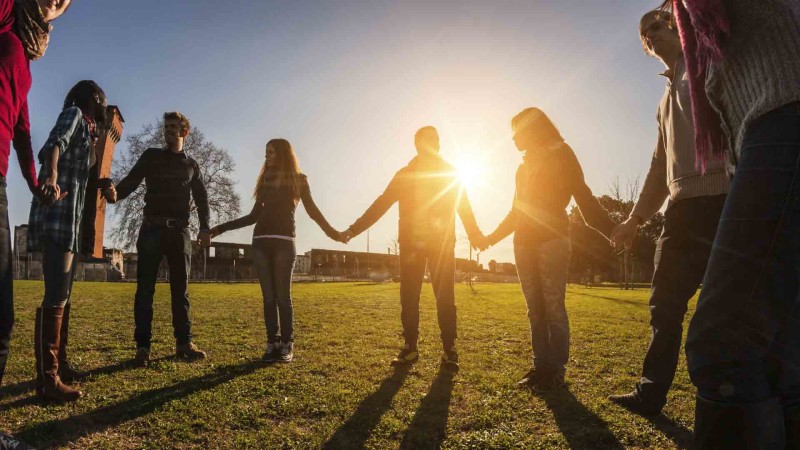"My grades were affected because I didn’t want to do anything in school,” Zepeda said. “I would just be sitting down and spaced out. My teachers began to check in with me. They were trying to support and give me help." He knows he didn't do everything he could to take advantage of the help teachers were offering.
Zepeda exhibited the kind of deep reflection and willingness to take responsibility that make this ritual successful. The other students are asked to stand if they believe the graduating senior has fully reflected on his or her obstacles and has set goals to improve. If friends believe a student can do better, they won't stand for them.
A concern about processes like this is that students pass one another without much critical thought, hoping peers will do the same for them when the time comes. But Life Academy teachers say they haven't seen that. Students explain why they will or will not stand for a classmate. The students often push each other to do homework on time or learn better work habits. Together, they come up with solutions.
Educators at Life Academy say this process works because middle and high school students care deeply about what their peers think. Many are more motivated to live up to peers' expectations than to those of adults,.
"The opinions that their peers have are much more influential," said former Life Academy principal Preston Thomas. "I believe that in turning it over to a peer process, it really does support the students to hear it differently."
When school leaders saw how well peer accountability worked for graduating seniors, they began to use the process at the beginning and middle of high school as well to help keep kids on track and shore up the community.
"For our 10th-graders, I feel like they get a reality check that the school doesn't revolve around them, that they're a part of what's revolving," said chemistry and health sciences teacher Amanda Issa. "If they've been hurting our community with the kind of drama that kids can have in high school, it's a chance to make them aware of it. When it's their own classmates saying, 'You hurt me because you're a distraction in class,' it opens their eyes."
When students don't stand for each other, it hurts, said Jamie Ortega, who graduated this year. During her reflection time, an advisor and a fellow senior hesitated to stand because they felt she hadn't proved she had a plan for how to advocate for herself when she is on her own in college.
"At the moment you feel really sad, especially when you're really attached to the person," Ortega said. "But at the same time you want to make sure you can give it your all so they can stand for you, and when they do, you feel very proud of yourself."
Life Academy began focusing on student reflection in this way about 10 years ago, after a teacher observed it happening at another high school, Bay Area School of Enterprise, in Alameda at the time.
"We were grappling with the question of how do you ensure that a student has really solid academic skills, but also create an environment where you're able to talk about character and work habits? We knew those were really important for success in life, but we didn't really have a way to hold students accountable," Thomas said.
Thomas said one circle of kids suggested that an eighth-grader should work on his reading, so he made a plan for five books to read over the summer and to stay after school in study hall next year because he realized he doesn't get his homework done at home.
Just this year, one of Amanda Issa's students didn't pass his reflection ritual at first because some of the people in the circle didn’t feel he had done everything he could to get the credits he needed to graduate.
"This is a big strong guy and I've never ever seen him cry, and he was in tears because people were saying they were proud of his growth and they know he can graduate," Issa said. The trust and care of his peer community during the reflection process made a difference for this student.
"I felt like he just lit up. He realized that time was running out and he had to get things together," Issa said. "He managed to do quite a lot in the last few weeks of school to make up credits and get a job for the summer."
Creating a space for kids to be vulnerable is hard to do so trust is an essential element for a program like this to work. “Rarely do I ever see adults do it,” Thomas said. “I think kids have a greater capacity to do that than adults do." That space itself provides a valuable life lesson for students.
"Everything is confidential," Zepeda said. "It's kind of like a diary. You can express yourself and they’ll give you advice if they need to. I feel like that's something I'll have in my future. I'll be able to express myself to the people in my life and see if they can help."


